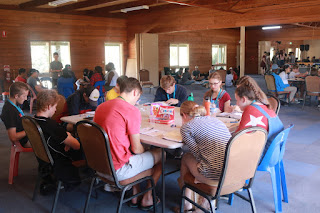 So says one student of youth ministry, and if it's true, it is a poor indictment on the Church that we allowed it to happen, but a terrible comment if it is still happening. Zirschky's book "Teaching Outside the Box" is something that can help the church to better train their teachers.
So says one student of youth ministry, and if it's true, it is a poor indictment on the Church that we allowed it to happen, but a terrible comment if it is still happening. Zirschky's book "Teaching Outside the Box" is something that can help the church to better train their teachers. Through the book, Zirschky presents five approaches to teaching, and as I read each approach I will seek to summarise what I've read.
I have already read this book, but felt it was something I needed to read again. Indeed it's something that I need to look through again and again to keep these different approaches in my mind or I will default to my normal style, no matter how ineffective it might be.
His first approach is "The Instructional Approach", and this is the closest to the five to my usual habit, though he offers a few suggestions that would have a significant impact on my teaching if I can take them up. Here are four important keys to the success of the approach:
- Teaching teenagers what the Bible says, or a focus on the content
- Bringing students to understand ( and trust) the content of Scripture
- Helping students recognize how the Bible should apply or make a difference in everyday life
- Equipping and preparing teachers for their task
 One difference between this approach and my own 'telling people what they need to hear' is allowing people to find the truth for themselves and seeking to make the application right through the lesson. This doesn't mean just pointing people to Luke 15 and asking what they make of it. Not at all. Rather, it is opening Luke 15, reading carefully what is found there, and pointing out the areas of application as we go through it, and determining how you will help the students / congregation work through these points and see the applications for themselves.
One difference between this approach and my own 'telling people what they need to hear' is allowing people to find the truth for themselves and seeking to make the application right through the lesson. This doesn't mean just pointing people to Luke 15 and asking what they make of it. Not at all. Rather, it is opening Luke 15, reading carefully what is found there, and pointing out the areas of application as we go through it, and determining how you will help the students / congregation work through these points and see the applications for themselves.Having listened to, and having preached, sermons that bang on about stuff for 25 minutes and hurriedly make some points of application, I am well aware of the far greater impact of application being made at each point of the sermon. I learned this some years ago from Jay Adams in his book "Preaching with Purpose", but it seems to be a lesson I need to keep learning. (and applying).
Zirschky is not just writing to encourage us to teach better lessons. He is writing with an understanding that it is the Holy Spirit who is the real teacher and it is our task to prepare / make the way for the Spirit to work. He comments:
"Change your theory of divine action, and logically, your teaching approach must change as well." (p45)Supporting our teachers well is also a theme in this chapter. Over the long weekend we have just enjoyed here in Australia, I was one of around 300 people attending the Engage Leadership Conference. We had some great Bible teaching there, and it was good to worship with such a group of people. But the purpose of this conference is much more than that. The purpose of this conference is to equip leaders to engage, handle and teach God's word. This is a conference that is truly seeking to support and equip our teachers.
Chapter One of "Teaching Outside the Box" is inspiring. I already know the other chapters are too. I hope my summary might help you too.
























